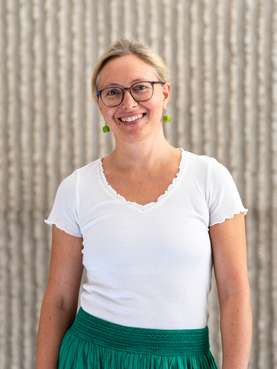Follicular lymphoma: cancer with long survival rate that keeps increasing
Follicular lymphoma is one of the blood cancers and blood disorders about which we are raising awareness in September, Blood Cancer Awareness Month 2022. Blood cancers and blood disorders can in fact be a great burden for patients, which is why we emphasize the significance of an early detection that enables successful treatment of these blood cancers and blood disorders.
“Follicular lymphoma is the second most common type of B-cell non Hodgkin lymphoma, immediately after diffuse large B-cell lymphoma. In 2018, 64 men and 65 women received this diagnosis in Slovenia. Follicular lymphoma is more common above 50 years of age,”
explains Jana Pahole, internist and oncologist at the Department of Treatment of Lymphoma at the Institute of Oncology Ljubljana.
“Lymphomas develop when B-lymphocytes grow out of control. This can happen in the bone marrow as well as lymph nodes, spleen, liver and other organs. Here lies the origin of symptoms and signs that allow us to detect the lymphoma. Since most subtypes of follicular lymphoma belong to the slow-growing or indolent lymphoma, this cancer can stay clinically hidden for a long time without causing any problems. This is the reason why patients mostly detect enlarged lymph nodes themselves, which urges them to visit their doctor,”
says Jana Pahole.
Signs and symptoms of follicular lymphoma
“When follicular lymphoma spreads, a wide range of problems may occur. The most common signs are enlarged lymph nodes on the neck, armpit and/or groin. Patients describe severe fatigue, which is persistent and doesn’t go away with rest; night sweat that is so intense they need to change their pajamas several times per night because of sweating around their neck and upper part of the body; increased body temperature without signs of infection; weight loss of more than 10% of body weight in the last 3 months; pain, change of appetite etc.,”
explains Jana Pahole. The diagnosis is first made on the basis of a cytological puncture and later by removing the affected lymph node to make a final histological diagnosis.
Follicular lymphoma is a very diverse cancer
Jana Pahole states that most detected follicular lymphomas based on the rate of cell division are slow growing or indolent.
“But there is a small part of follicular lymphomas that are fast growing, which puts them close to aggressive lymphomas. This is why a histological definition is essential for further treatment of the patient,”
points out the oncologist Pahole. When follicular lymphoma is confirmed, the patient is examined to limit the cancer and determine its stage.
Follicular lymphoma is a slow-growing cancer.
“Regardless of its stage, follicular lymphoma is considered to be mostly incurable. On the other hand, follicular lymphoma has a very long survival rate – 18 years on average, and with new medications this number keepsincreasing. For this reason, follicular lymphoma can become a chronic cancer, monitored in regular time intervals, similar to increased blood pressure, heart failure or diabetes,” says Jana Pahole.
In its earlier stages (stage I and II), follicular lymphoma can be treated with local radiotherapy.
“Because follicular lymphoma is a slow-growing cancer, the treatment (even in stages III and/or IV) can be postponed until problems occur or major deviations in the blood count or imaging diagnostics are detected,” tells the oncologist.
Efficient and emphatic communication is essential
Jana Pahole finds that at first it is difficult for patients to accept the fact they have a malignant cancer which is not treated immediately. This is why, she points out, efficient and empathic communication is essential. Patients need to be thoroughly explained that there is no need to rush.
“It is also important to regularly monitor the condition, most often with ultrasound examination and blood count analysis, and provide the possibility of an early examination in case of significant changes in the patient’s wellbeing or quick growth of one of their lymph nodes,” says the oncologist.
Follicular lymphoma treatment
When treatment is necessary, treatment with combined immunochemotherapy (ICT) is introduced. The type of therapy and the number of cycles depend on the age and condition of the patient, follicular lymphoma size and associated diseases. For two years after the concluded immunotherapy patients undergo maintenance treatment with biologic medications.
“The purpose is to delay cancer recurrence. In most cases, even with successful treatment the cancer eventually recurs. The prognosis is worse for patients in whom cancer recurs in less than 24 months after completed treatment. Even in the later lines of treatment we can use local radiotherapy or new combinations of medications. Based on clinical research, there are a few new active ingredients available already registered for treatment of recurrent follicular lymphomas, and there is plenty of ongoing research in the field of follicular lymphoma treatment,”
says the oncologist Jana Pahole.
Blood Cancer Awareness Month 2022After last year’s high-profile campaign, with which we warned the Slovenian public about the great burden of blood cancers and blood disorders, in September, Blood Cancer Awareness Month 2022, we again point out the symptoms and signs of blood cancers and blood disorders.Once again this year we organize the campaign with the Association of Patients with Blood Diseases Slovenia and the Slovenian Lymphoma and Leukemia Patients Association, L&L and the professional support of hematologists and oncologists. The campaign is enabled by Novartis. This year among blood cancers and blood disorders we especially point out follicular lymphoma, chronic myeloid leukemia (CML) and graft-versus-host disease (GVHD). In September, numerous activities are taking place across Slovenia, emphasizing the significance of an early detection and treatment of blood cancers and blood disorders. Find the calendar of activities attached. |
Contact information: sergeja.sirca@aetas.si / +386 41 280 201 / info@aetas.si / +386 51 652 344

